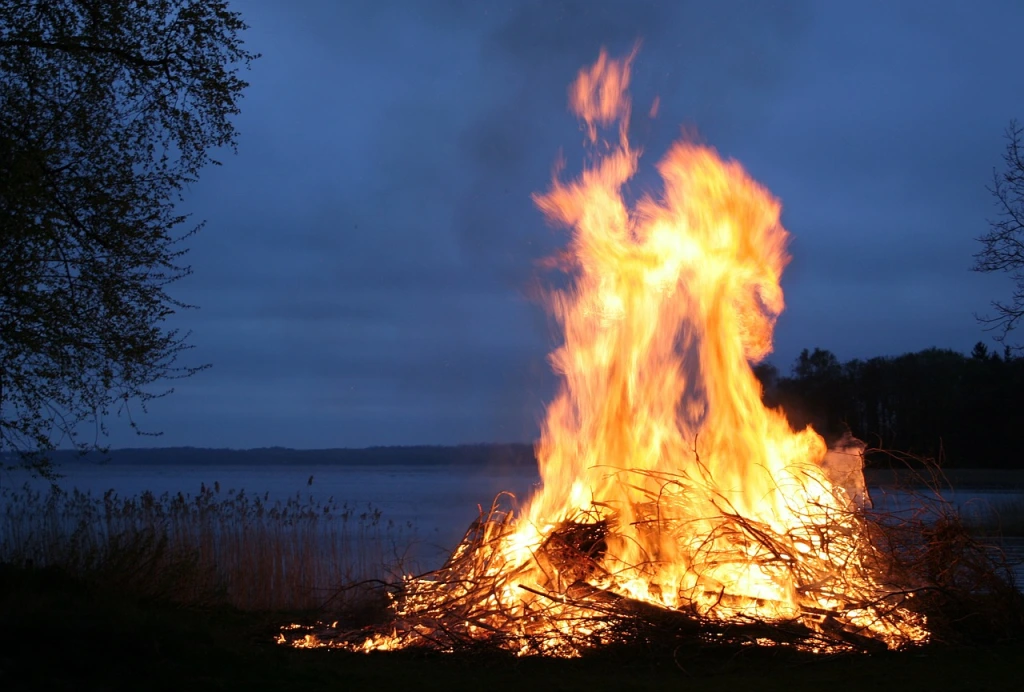In December of the year 755, the An Lushan Rebellion began.
Thus, the four horsemen of the Apocalypse are let loose on the Chinese Nation. Inappropriate allusion, but accurate since conquest, famine, war, and death swept the country.
Quickly, General An Lushan and his army swept down from the north and moving rapidly along the Grand Canal. Within a year later, rebel forces were at the gates of the capital Chang’an (modern Xi’an). The emperor decides to flee. Du Fu attempts to join him, but is caught by the rebels and taken back to Chang’an, where, it is said, this poem was written.
Du Fu’s view of the coming spring is conflicted. The 45-year-old Du Fu had removed his family to safety and a son was born. He certainly wanted to hear that they were safe. He was also fearful of his standing with the court in exile.
The beacon fires Du Fu speaks of were an ancient method of passing military information. In Europe, beacons were used by Romans and throughout the Napoleanic wars. The modern telegram rendered them obsolete.
Spring View
A nation is broken by war, yet mountains and rivers exist
Spring comes to the city walls, where grass and trees still grow
This season it feels like blossoms are splashing like tears
I hate to depart, for the birds are scared in their hearts
Three months now, the beacon fires of war have burned
And one letter from home is worth ten thousand pieces of gold
While I scratch my white hair that has grown thin
Darken my desire not to be able to use a hairpin
Original Chinese
春望
國破山河在
城春草木深
感時花濺淚
恨別鳥驚心
烽火連三月
家書抵萬金
白頭搔更短
渾欲不勝簪
Poem explained
Du Fu had reason to fear the future. He was a married man with children to support. In 755 he received an appointment as Registrar of the Right Commandant’s Office of the Crown Prince’s Palace, a heady title but a minor post, but a start. The rebellion, the abdication of the emperor and his replacement, along with Du Fu’s capture was not a good omen. Though Du Fu was able to escape from the rebels, he was at first treated as a traitor. Though vindicated, he did not enjoy the new emperor’s full favor.
The hairpins in the last line of the poem are a metaphor for the union of two souls. Both men and women used hairpins and it was the custom in a Chinese marriage for husband and wife to exchange a hairpin.
Chang’an was taken by the rebel forces of An Lushan in 756 and much of it was destroyed. Tang forces retook it in 757. This dates Du Fu’s poem to the spring of 757, shortly before he left the city to rejoin the emperor.
French translation
Vue du printemps
Un pays brisée par la guerre, mais des montagnes et rivières existent
Le printemps arrive aux murs de la ville, et l’herbe et les arbres poussent encore
Cette saison, il semble que des fleurs éclaboussent comme des larmes
Je déteste partir, car les oiseaux ont peur dans leurs coeurs
Trois mois, les feux de guerre de la balise ont brûlé
Une lettre chez-soi vaut dix mille pièces d’or
Alors que je gratte mes cheveux blancs qui ont grossi
Obscurcir mon désir de ne pas pouvoir utiliser une épingle à cheveux
German translation
Frühlings-Ansicht
Eine Nation gebrochen, noch Berge und Flüsse existieren
Der Frühling zu den Stadtmauern kommt, wo Gras und Bäume noch wachsen
In dieser Saison es wie Blüten fühlt sich tummeln wie Tränen
Zu verlassen Ich hasse, denn die Vögel in ihren Herzen Angst haben
Drei Monate jetzt, das Feuer des Krieges verbrannt
Und ein Brief von zu Hause wert zehntausend Goldstücke
Während ich mein weißes Haar kratzen, die dünn ist gewachsen
Verdunkeln mein Wunsch, nicht in der Lage sein eine haarnadel verwenden












